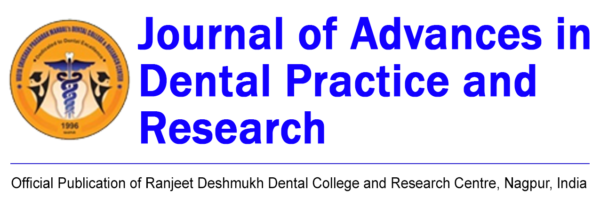Translate this page into:
Green dentistry: A way for sustainable future
*Corresponding author: Saee Deshpande, Professor, Department of Prosthodontics, Ranjeet Deshmukh Dental College and Research Centre, Nagpur, Maharashtra, India. saeedeshmukh@vspmdcrc.edu.in
-
Received: ,
Accepted: ,
How to cite this article: Deshpande S. Green dentistry: A way for sustainable future. J Adv Dental Pract Res. 2024;3:33. doi: 10.25259/JADPR_1_2025
The preservation of our world and its natural resources, such as air and water, depends on the sustainability practices we adopt today. Reducing pollution and preserving animal and plant habitats are two benefits of creating a sustainable future and a sustainable lifestyle.
A new area of dentistry called “green and sustainable dentistry” aims to reduce the ecological impact of dental offices by developing eco-friendly procedures. Many dentists are incorporating sustainable methods into their practices as environmental consciousness grows, both to safeguard the environment and to advance the general well-being of the community.
Fundamentally, green dentistry entails reconsidering conventional dental procedures and supplies. This method places a strong emphasis on using environmentally friendly products, cutting waste, and making thoughtful decisions that are good for the environment and patients. The choice of dental materials is a crucial component of sustainable dentistry. Numerous common materials, like mercury amalgam used in fillings, are hazardous to human health and the environment. The use of biocompatible materials, such as glass ionomer and composite resins, which are less hazardous and frequently more visually beautiful, is encouraged by sustainable dentistry instead. Another essential element of green dentistry is energy efficiency. Through the use of energy-efficient lighting and technology, dental practices can reduce their electricity usage and operating expenses. Dental offices can further reduce their dependency on fossil fuels by installing solar panels on their roofs to capture renewable energy sources. Energy consumption can also be significantly decreased by making the most of heating and cooling systems. Water conservation is extremely important in sustainable dental practices. Dental procedures frequently require the use of water, but clinics can take steps to conserve this valuable resource. Using efficient dental equipment, such as water-saving handpieces, installing low-flow fixtures, and checking for leaks on a regular basis can all help to minimize water waste significantly. Furthermore, clinics can educate patients about the need for water conservation and promote environmentally friendly dental hygiene practices. Waste management is an essential part of sustainable dentistry. Traditional dental practices produce a large amount of trash, including single-use plastics, disposable devices, and dangerous materials. Green dentistry aims to reduce waste by developing recycling initiatives and using reusable devices whenever possible. Clinics can also use digital technology to reduce paper waste by prioritizing electronic records, correspondence, and appointments. Recycling goods such as dental plastics and paper allows clinics to considerably minimize their landfill commitments. Participation and education in the community are also crucial components of green dentistry. Dentists may be quite helpful in teaching their patients the value of sustainability and motivating them to incorporate eco-friendly habits into their everyday lives. The influence of sustainable dentistry can be further expanded beyond clinic doors by holding community workshops on subjects like how to properly dispose of dental items or the significance of minimizing plastic usage. To sum up, sustainable and green dentistry signifies a revolutionary change in the direction of ecologically conscious dental treatment. Dental professionals can greatly lessen their environmental impact using eco-friendly materials, preserving water and energy, properly handling trash, and interacting with the community. In addition to helping the environment, this movement improves patient health and well-being, paving the way for a better future for both people and communities.
Dr Saee Deshpande-Deshmukh
(Editor in Chief, Professor, Dept of Prosthodontics, Ranjeet Deshmukh Dental College and Research Centre, Nagpur)





